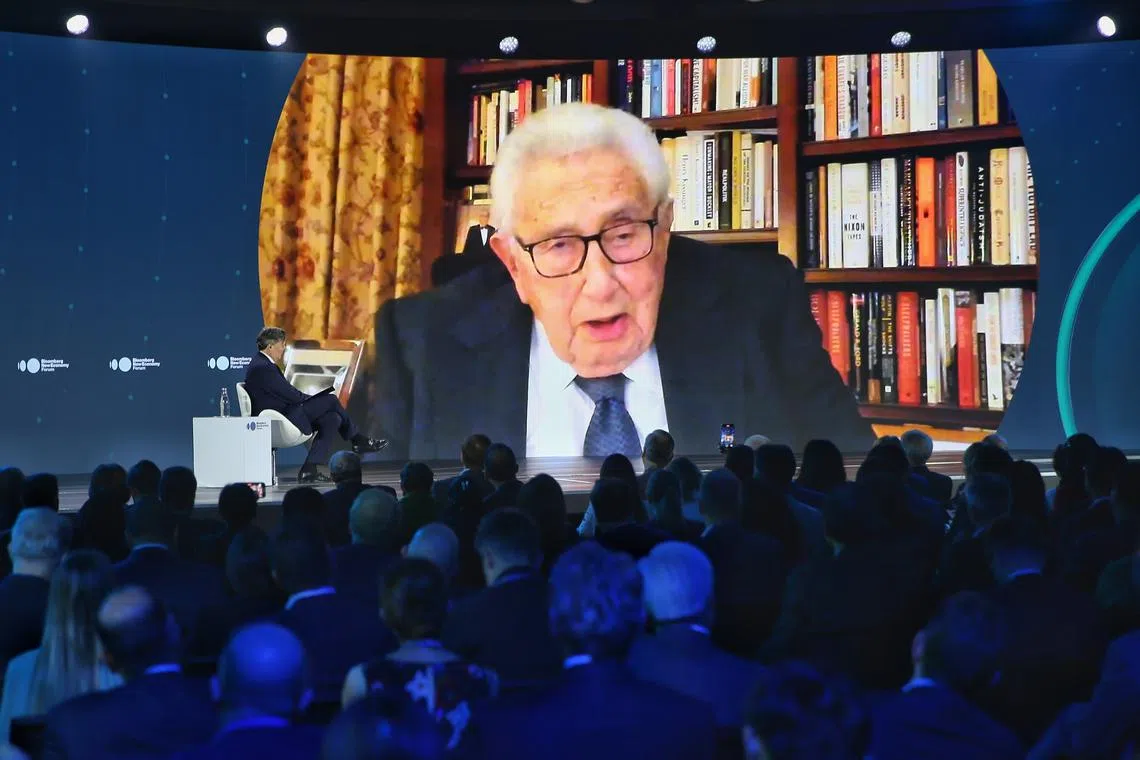Bringing Russia into European system on basis of equality, respect will help end Ukraine war: Kissinger
Sign up now: Get ST's newsletters delivered to your inbox

Dr Henry Kissinger speaking over a virtual call at the Bloomberg New Economy Forum 2022 on Nov 15, 2022.
ST PHOTO: FELINE LIM
Follow topic:
SINGAPORE - Ending the war in Ukraine
This would mean rethinking the structure of Europe, and trying to bring Russia into the European system in the same way Germany was inducted after World War II, said the former United States secretary of state and national security adviser.
Speaking at the Bloomberg New Economy Forum in Singapore over video link, Dr Kissinger, 99, said that for there to be peace, Russia needs to be included in Europe on the basis of equality and mutual respect, and there has to be an end to “the institutional threats that have characterised Russia’s relationship to Europe”.
Moscow has for decades warned that Nato’s expansion into Eastern Europe would be met with serious resistance, as it threatens Russia’s security.
Dr Kissinger said this is one of three principles needed to end Russia’s war in Ukraine.
The other two are a decision by the key participants to end the conflict, and an agreement that Ukraine will emerge from the war as an independent country with substantially the same borders it had when the war began, protected by a close relationship with Europe.
Asked if this means Russian President Vladimir Putin has to go, Dr Kissinger said that for some people, Mr Putin is an obstacle to achieving peace. But if Mr Putin embraces these principles, the world should not focus only on overthrowing him, added the veteran US diplomat.
Asked by moderator and Bloomberg editor-in-chief John Micklethwait if Mr Putin was capable of doing this, given that he started the conflict, Dr Kissinger said the goals he outlined are difficult but attainable.
“The world now faces a big challenge of defining for itself what its objectives are, and not to be driven entirely or largely by the pressures of the moment,” he said.
The difficulties lie in the lack of a “conceptual dialogue” with Russia, which the US has with China, said Dr Kissinger.
On Monday in Bali, US President Joe Biden and Chinese President Xi Jinping met in person for the first time since Mr Biden took office. At the meeting, both leaders expressed the desire for their countries to work together to manage tensions and avoid conflicts.
The meeting has laid a basis and obligation for concrete discussions between the US and China on a variety of topics, Dr Kissinger told more than 500 leaders from the public and private sectors at the forum.
What has been identified for cooperation so far are climate change and the overall global economic situation, which are important and uncontroversial topics. He urged the two sides and other partners to, in the months ahead, focus on attempting to solve specific issues such as those involving the South China Sea.
The South China Sea remains a prickly issue among claimants such as the Philippines, Brunei, Indonesia, Malaysia, Taiwan and Vietnam, which challenge China’s expansive claims over the body of water.
Mr Micklethwait asked if South-east Asia would be the battlefield between China and the US. He noted that US House Speaker Nancy Pelosi’s visit to Taiwan in August was not seen as constructive by countries in the region. Her visit drew fierce criticism from China, which responded with a raft of military exercises.
Dr Kissinger said the countries of South-east Asia have achieved substantial economic progress and, for several like Singapore, stability as well. These countries do not want one country dominating the region and prefer dialogue rather than confrontation, he added.
When asked if the late Mr Lee Kuan Yew, who was friends with Dr Kissinger, would have been more worried by what is happening between the US and China or between the US and Russia today, Dr Kissinger said he believed Mr Lee would have been “dominantly worried” about a clash between the Americans and the Chinese.
“He believed that the safety of the peoples of Asia would be jeopardised if the two greatest nations – to one of which he belonged by culture and the other one he recognised and respected on the basis of (its) achievements – were to be contesting their special qualities,” he said.


